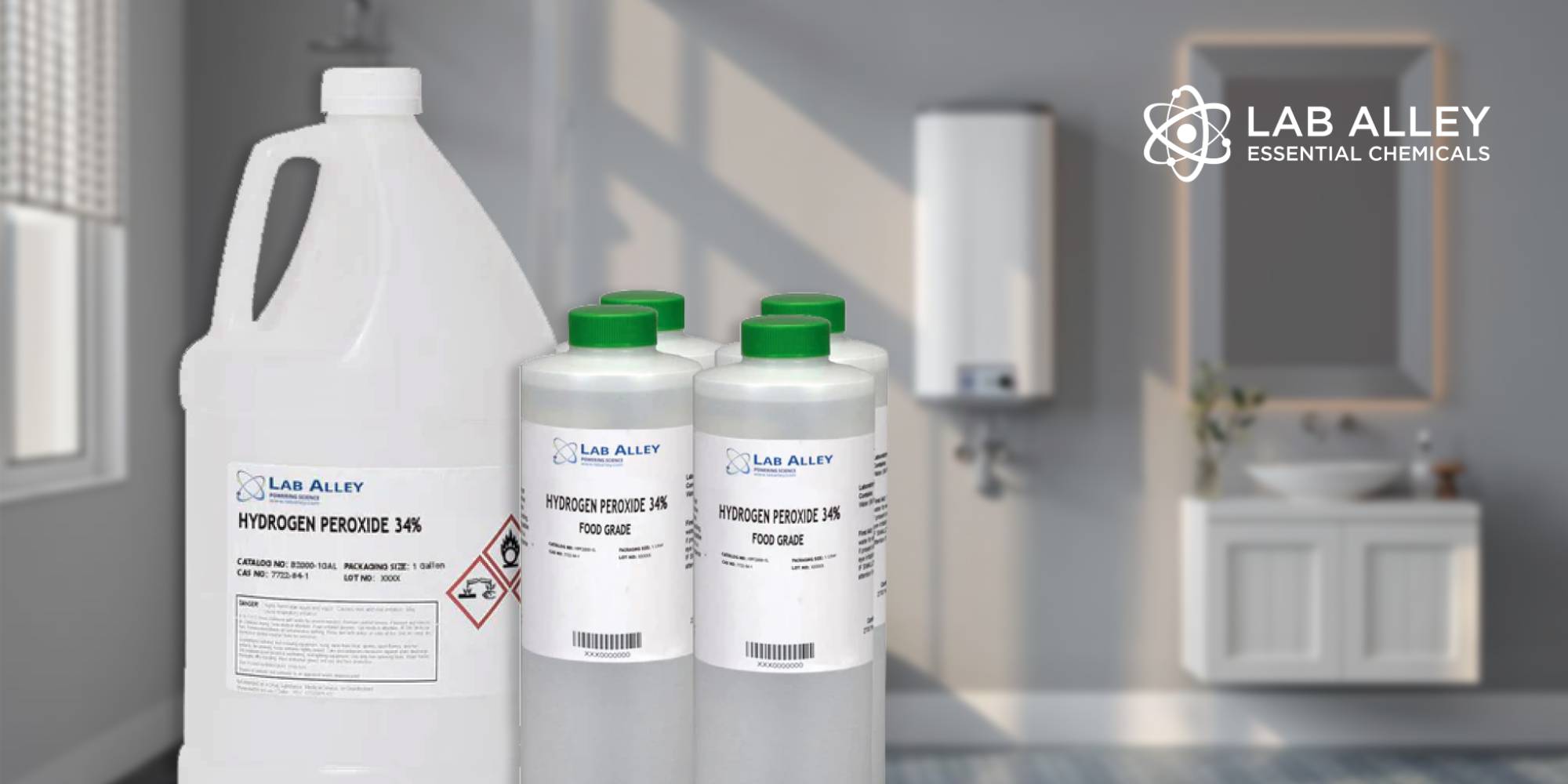All about hydrogen peroxide cleaners
By Jillian Jastrzembski
Did you know that hydrogen peroxide is a highly effective, broad-spectrum disinfectant that is also safe and environmentally-friendly?
Hydrogen peroxide was discovered over 200 years ago, and the disinfectant properties of this household chemical have been known since as early as the 1890s. It is most commonly sold in the US as a 3% solution, or as an active ingredient in cleaning products.
In this article we’ll cover:
- What makes hydrogen peroxide such a useful disinfectant
- How to use it and how not to use it
- How to make hydrogen peroxide work most effectively
What is hydrogen peroxide?
Hydrogen peroxide is a clear liquid with the chemical formula H2O2. The chemical formula is only one oxygen different from that of water, H2O. In fact, hydrogen peroxide readily breaks down to yield water and oxygen, according to the following equation:
2H2O2 –> 2H2O (l) + O2 (g)
Because it decomposes into these innocuous products, hydrogen peroxide is a relatively safe and environmentally-friendly chemical. For this reason, hydrogen peroxide cleaners are often preferred to chlorinated solvents. Additionally, hydrogen peroxide is naturally produced within our own cells.
Hydrogen peroxide stability
Although it eventually degrades to form water and oxygen in the presence of heat or light, hydrogen peroxide is a very stable compound under proper storage conditions. When stored in a dark container at room temperature, hydrogen peroxide can be expected to undergo degradation at a rate of less than 2% per year.
How do hydrogen peroxide cleaners work?
When used properly, hydrogen peroxide can be an effective biocide against several microorganisms, including:
- Bacteria
- Viruses
- Fungi
- Yeasts
- Spores
Hydrogen peroxide is a powerful oxidizer, which accounts for its broad-spectrum biocidal activity. It works by producing hydroxyl radicals, which are extremely reactive. The hydroxyl radicals can attack critical cell components including lipids, proteins, and/or nucleic acids (DNA).
Hydrogen peroxide is also produced endogenously in your own tissue, where it plays many vital roles. This is often cited as proof of hydrogen peroxide’s safety.
Endogenous hydrogen peroxide is important for wound healing, innate immunity, and apoptosis (non-pathological cell death). For this reason, your cells have evolved to have anti-oxidation mechanisms. These mechanisms allow hydrogen peroxide to perform its role without causing oxidative harm to the cell. For example, cells contain an enzyme called catalase, which breaks down hydrogen peroxide into water and oxygen.
However, endogenous hydrogen peroxide comes from inside the cell. When hydrogen peroxide comes from outside the cell, it may attack the lipids and proteins which comprise the cell wall before catalase can get to it.
How to use hydrogen peroxide as a cleaning agent
Because of its relative safety and broad-spectrum efficacy, hydrogen peroxide is useful in medical, food, and environmental applications. Hydrogen peroxide cleaners are used in the following ways:
- Disinfection of medical equipment
- Disinfection of food surfaces
- Cleaning edible produce
- Water treatment
- Cleaning hard surfaces
Due to its strong oxidizing capabilities, hydrogen peroxide is also a highly effective bleaching agent. It works best on brightly-colored stains by breaking down the pigmented molecules so that the stain “disappears.”
Concentration and pH
Hydrogen peroxide is an effective disinfectant in the concentration range of 3% to 25%. Depending on the application, the pH is also worth considering. Hydrogen peroxide cleaners are often formulated at low pH to improve stability. However, the bleaching properties of hydrogen peroxide are more effective at high pH. Since laundry detergent tends to be alkaline, mixing hydrogen peroxide with detergent is a good way to exploit the bleaching capabilities.
Should you use hydrogen peroxide to clean wounds?
There are mixed reports over whether hydrogen peroxide should be used for wound healing. Research suggest that hydrogen peroxide does not reduce bacterial counts, and actually impedes wound healing by killing the body’s innate immune cells. Iodine or simply soap water may be better options for cleaning wounds.
Advantages of hydrogen peroxide cleaners
- Low environmental impact: Hydrogen peroxide degrades into innocuous products, water and oxygen, making it a preferable alternative to chlorinated cleaning agents.
- Relative safety: Hydrogen Peroxide has GRAS (Generally Recognized as Safe) status, and is appropriate for use in food applications.
- Broad-spectrum biocidal action: Because of its strong oxidizing capabilities, hydrogen peroxide is effective against many different types of microorganisms, including yeasts, spores, bacteria, viruses, and fungi
- No noxious odor: Hydrogen peroxide cleaners, when well-formulated, do not have a disagreeable odor.
- Fabric-safe bleaching agent: Hydrogen peroxide based bleaching agents are generally more fabric and color-safe compared to alternatives.
Have you been sleeping on hydrogen peroxide cleaners? Lab Alley offers hydrogen peroxide in multiple concentrations and sizes, so you’ll be sure to find the product that perfectly suits your needs.
< Back


